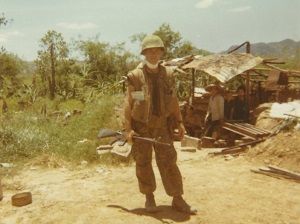| VFW Connections |
 |
Ron joined the VFW while in the Marine Corps stationed in New Hampshire. Although he wasn’t very active with the organization in his early years, he joined our post in the mid-90s. He served as the Post 1503 Commander from 2002-2004 and again from 2007-2009. He has also served as the Commander of the Military Order of the Purple Heart (Semper Fi Chapter) in our area for the past 24 years. Through his involvement as a post trustee and officer, he has worked tirelessly to ensure we are meeting the needs of all our veterans.
|
In January of 1964, Ron enlisted in the Marine Corps and started his training at Parris Island. He also married his wife, Angela, in 1964. They had known each other growing up and were raised in the same area. They both enjoyed military life and its adventures.
Ron was stationed in Kaneohe, Hawaii, with the 2nd Battalion, 4th Marines. Although he had not previously completed high school, his Platoon Sergeant told him to take the GED test. Despite not studying, he passed the GED requirements for Florida’s state credentials. From there, Ron’s first 13-month deployment started in Vietnam at Chu Lai and Phu Bai. Ron then served as an enlisted instructor at the officer’s school in Quantico. Ron was transferred to the now-shuttered Portsmouth Naval Prison in New Hampshire, which housed 1100 inmates, where he was promoted to Sergeant. It was here he became interested in correctional organization, which would later define his post-military career. During this time, he also decided to reenlist for another six years. He was supposed to go to Drill Instructor School, but was told he would have to go for a second tour in Vietnam before the additional training.
Ron returned to Vietnam for his second tour in 1969. It was during this time he received the nickname Papa Six. While stationed with the 2nd Battalion, 5th Marines, he was the Infantry Platoon Sergeant, one of three Platoon Sergeants. Their standard radio call sign was "Papa Sierra,” to stand for their ranks. To help distinguish him from the other two platoon sergeants, his personal call sign was "Three Papa Six,” to show he was part of the third platoon. He also earned a reputation for his success in night ambushes with a small team of Marines and a radio operator.
It was four and a half months into this tour that Ron was wounded. Although he had been looking forward to his upcoming R&R in Hawaii to see his wife, this second deployment put him deep in harm’s way during an ambush. During close engagement, a rocket from one of their Bronco planes landed beside his right foot and threw him into enemy lines. Although his Marines tended to him quickly, his right shoulder and lung were severely injured, and his right eye was permanently blinded. He was ultimately saved when their resupply chopper heard the emergency medivac call and agreed to take him for medical care. He was taken to a hospital in Da Nang for four days to stabilize his lung before flying to Japan and finally to the naval air base in Jacksonville, FL. He spent a total of 15 months in the hospital. Ron was awarded a Purple Heart for his injuries in the attack.
After receiving his medical discharge from the Marine Corps in October of 1970, Ron decided to pursue college. He started his college program at St. Petersburg Junior College for his associate degree and finished his Bachelor of Criminology at the University of Tampa. He continued with graduate school at the University of South Florida and completed the criminal justice program in 1975. He was on the Dean’s List in college, earning a 3.2 GPA as an undergrad and an impressive 3.7 as a graduate student.
 Once his studies were complete, he became a juvenile probation officer in Pinellas County, FL. In 1976, the Department of Justice called him to apply for a job interview in Atlanta. Ron was a bit perplexed, as he had not put in an application for such a position. However, they explained they looked at everyone who earned a graduate degree and were impressed by his thesis on juvenile recidivism. Once it became clear the caller was serious and this opportunity would be worth the expense of the travel, he flew up for an interview with a panel. He learned the position would be with the Law Enforcement Assistance Administration (LEAA) in the Department of Justice. Four days later, he received a call to officially offer him the job.
Once his studies were complete, he became a juvenile probation officer in Pinellas County, FL. In 1976, the Department of Justice called him to apply for a job interview in Atlanta. Ron was a bit perplexed, as he had not put in an application for such a position. However, they explained they looked at everyone who earned a graduate degree and were impressed by his thesis on juvenile recidivism. Once it became clear the caller was serious and this opportunity would be worth the expense of the travel, he flew up for an interview with a panel. He learned the position would be with the Law Enforcement Assistance Administration (LEAA) in the Department of Justice. Four days later, he received a call to officially offer him the job.
Ron headed to Atlanta just three and half weeks later to work at the department, which was responsible as a grant-funding agency that provided finances to the criminal and juvenile justice improvement programs for different states. He ended up being assigned to Mississippi, working with Senator Jim Eastland (D), who chaired the Senate Judiciary Committee and had oversight of the Omnibus Crime Control and Safe Streets Act. Ron also worked with Senator Thad Cochran (R), who also oversaw many programs to benefit veterans.
In 1977, a closure of several regional offices moved Ron to the Virginia area to continue his work and support the mission on a national level. He headed up the Missing Children’s Program for the department under Attorney General Janet Reno and was responsible for creating the Child Protection division. He was the lead person on missing children’s investigations nationwide, also training police officers, prosecutors, and judges. In his role, he worked with community stakeholders to investigate and bring justice to cases involving missing, abused, and neglected children. He spent 37 years with the Department of Justice and retired as the Director of the Child Protection Division. (At the time, it was called the Office of Justice Programs. As the Administrator, Ron oversaw the Child Protection Division in the Office of Juvenile Justice and Delinquency Prevention.) Although it was beyond his job requirements, Ron also found himself being called up to the Hill to help share his perspectives on veteran issues. His work was also publicly recognized by the National Counsel of Juvenile and Family Court Judges and the National District Attorney Association as one of their "25 success stories” in the profession.
Despite being retired for 10 years, Ron still consults with the Department of Justice and speaks at several national conferences annually. For example, in January of 2022, Ron traveled to San Diego to speak at the 37th Annual International Conference on Child and Family Maltreatment. Much of his current work is through Fox Valley Technical College in Wisconsin where he is a consultant. They house the National Criminal Justice Training Institute, where Ron initially worked while he was still with the Department of Justice. Because Ron is well-regarded in this field, they have built a partnership to have him speak about the training opportunities for investigating child abuse, combatting neglect, and helping missing and runaway children on a national level.
As he cares deeply for Post 1503, Ron hopes the post officers and members continue to be proactive in supporting all veterans and their families. Many new veterans don’t realize how many benefits they are eligible to receive for their service, so he wants to ensure we share more information about the Veterans of Foreign Wars as an organization and follow up with assistance. As we have a large membership and have the opportunity to be a substantial asset to our local community, he wants to be sure we pursue a seat at the table and communicate our successes with the local media.
Ron has two adult sons, and has also raised his two grandchildren. His beloved wife, Angela, passed away in May of 2021.
- - Ron’s birthplace of Kannapolis, NC is also Dale Earnhardt’s hometown. (The city even has a nine-foot statue built in his Dale’s honor.)
- - During one of his first visits to Post 1503, two Marines recognized Ron and called out to him with his Vietnam call sign: Papa Six. Although he hadn’t gone by this moniker in many years, the nickname stuck and most still affectionally refer to him as Papa Six around the post.
- - Ron credits the Marine Corps for helping him to identify his passions, as he completed a few courses in corrections through the University of New Hampshire while still on active duty. Although some said he was "really not college material,” Ron retorted by saying, "Well, you don’t know much about Marines.”
- - Later in Florida, Ron was able to meet with the doctor who treated him when he was wounded in Vietnam. The doctor said, "We knew you had the fight in you.”
- - Over 3000-4000 individuals per year are trained using the techniques Ron developed as part of his work for the Department of Justice.
- - Ron’s success story was featured in the 2000 Juvenile Justice Bulletin publication entitled "Second Chances: Giving Kids a Chance to Make a Better Choice.”
- - Ron credits his mother and his wife as being the two great supporters in his life, even when others had their doubts about his ability to succeed.
